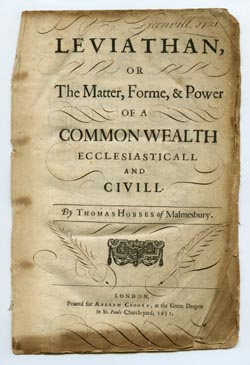Dean of Physical and Biological Sciences Stephen Thorsett has donated a first edition of English philosopher Thomas Hobbes's famous 1651 book, Leviathan, to the UCSC Library's Special Collections.
Titled after the biblical Leviathan, the book helped to establish the foundation for Western political philosophy. Written during the English Civil War, it stresses the necessity of a strong central government in order to avoid chaos and civil war.
The 357-year-old first edition was purchased by Thorsett's father-in-law, Donald Dewey, while he was studying in London after World War II on the GI Bill. Thorsett noted that the book was banned after publication and much of the first print run was lost in the 1666 Great Fire of London, which led to a quick second printing in England and a third underground printing in Holland. He added that the book has been appraised at $3,500.
"Although the binding has separated, the book itself is in very good condition," Thorsett said. "It is, however, missing the famous engraved title page that shows Leviathan made up of the bodies of his subjects. Probably this was removed by an earlier owner and separately framed and displayed. With that engraving it would perhaps be worth 10 times as much to a collector."
Thorsett obtained the book a few years ago, after Dewey died and his wife Ruth gave it to the Thorsett family. The receipt for the purchase (2 pounds!) was still in the Leviathan when they donated it to Special Collections.
"Holding onto this book from 1651 really feels like holding onto a piece of history," Thorsett observed. "The names of many of its previous owners are inscribed on its front and back pages, along with some impressive quill-work; perhaps one day someone will trace back through these and learn more about its first three centuries before Don found it."
"Rachel and I gave the book to the library because we felt that it should be in a place where it could be cared for properly, and used and appreciated by students and researchers," he added. "We thought it seemed particularly appropriate that it be given to a great public institution, since it was with public support through the GI Bill that it came into the family. And giving it in memory of Don Dewey gave us a way to remember him along with the book collecting that he enjoyed so much."




